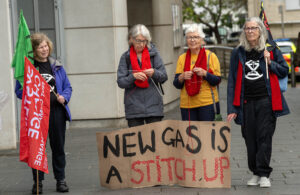HS2 given go ahead but ecological impacts will be ‘devastating’
Yesterday (February 11), Boris Johnson confirmed that the HS2 rail line from London to Birmingham, Manchester, Leeds and Liverpool will go ahead.
The project has faced delays after growing concerns over the mounting cost of the project, which is now estimated to be over £100bn, more than triple the original estimations.
HS2 has also faced criticisms over the ecological impact that bulldozing through the British countryside will have on wildlife and ecosystems that are already under threat.
Last month (January 15), the Wildlife Trust published a comprehensive report outlining the full environmental and ecological impacts of HS2.
According to the report, HS2 goes through five internationally designated protected wildlife sites, which as a result will put many species, such as the barn owl, at risk of extinction by destroying their habitat and polluting their environment.
After publishing their report, the Wildlife Trust received 66,000 signatures in just two weeks on a petition asking the government to stop and re-think HS2.
Despite taking this petition to Downing Street just last week, this public outcry has been ignored and HS2 has been given the go-ahead, according to Dr Rachel Giles, evidence and planning manager at Cheshire Wildlife Trust.
Giles has been heavily involved in the report, campaign and the petition, she has worked for The Wildlife Trust for over nine years and began researching the impact of HS2 in 2014.
‘Yesterday’s announcements are devastating for everyone at The Wildlife Trust,’ said Giles.
Because HS2 is a national infrastructure project it is not under the National Planning Policy Framework, and instead, it has its own planning policies that were put in place ten years ago.
‘If this project had been put through the national planning process it would have been thrown out for being far too damaging.
‘But instead, HS2 has been approved based on outdated principles that do not consider the UK’s international obligations to biodiversity loss.
‘It’s the biggest infrastructure project that this country has ever seen, and the most damaging.
‘The Wildlife Trust is in favour of sustainable transport, but not at any cost.
‘HS2 is being promoted as a sustainable transport system, but the definition of sustainable involves the economic, social and environmental impacts.
‘This is not a sustainable transport system by any definition of the word.’
Not only has HS2 managed to avoid planning restrictions but according to Dr Giles, the ecological impacts are being downplayed, with HS2 being dishonest about what the impacts will be.
‘There is a policy which states that the project will not allow any net biodiversity loss.
‘Not only are they going to miss this target; they will miss it substantially, and we have shown this in our report.
‘In order to achieve ‘no net biodiversity loss,’ plans have been made to plant 7 million trees to compensate those lost.
‘But these trees will be planted to screen the railway and reduce noise, they won’t be natural woodlands or native trees.
‘This is not enough, it’s outrageous.’
The railway will also destroy many sites that are recognised regionally for their ecological importance, and these facts have been purposefully omitted from their environmental statement, according to Dr Giles.
‘In South Cheshire, HS2 will go right through the middle of a site that is known for its importance for various bird populations, such as yellow wagtails, tree sparrows, skylarks.
‘But in their environmental statement, when they summed up the residual impacts this was omitted because there is nothing they can do about it.
‘They shouldn’t be allowed to selectively withhold information, they are making environmental statements that are incorrect, on information that is deliberately removed or not included and they are using these policies to get political support and get the scheme through.
‘It is unacceptable.’
Photo Credit – Pixabay















